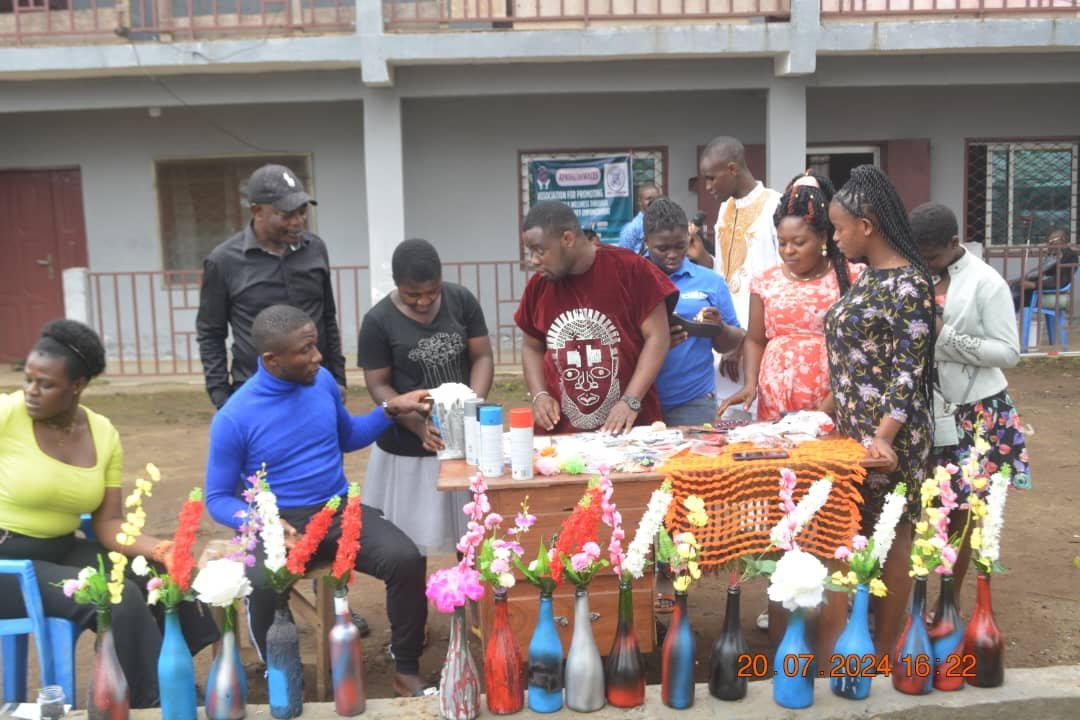By Princeley Njukang, Cameroon.
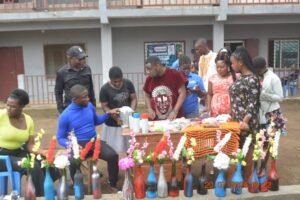
Over 25 disabled and vulnerable persons affected by the Cameroon Anglophone Conflict have been empowered to become bread winners for themselves and their families. This was at a five-day skills acquisition workshop, that held in Buea from the 16th to the 20th of July, 2024.
Aimed at disabled and vulnerable persons affected by the 8-year-long Anglophone Conflict in Cameroon’s Northwest and Southwest Regions, the training, which was in its maiden edition, schooled participants in three different domains: beading, Recycling and kneading.
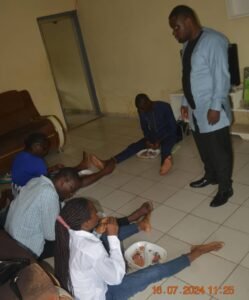
The three skills, according to organizers, were selected with high considerations for disability friendliness, teachability within a short period, and current market demands.
The skills acquisition workshop was the product of a network of three organizations, concerned about providing hope to vulnerable and disabled persons, promoting their inclusion, and ensuring that they are empowered to becomeautonomous and self-sufficient contributors to their communities. These organizations, Hopeful Home for All (HOFA,) , the Association for Promoting Global Health and Wellness through Advocacy, Community Empowerment and sustainability (APROGLOHWCES,) as well as DNA’s parent organization, Foundation for the Inclusion and Empowerment of Persons with Disabilities (FIEPWD,) worked under the banner, Reformers. They believe that part of the process of pressing for disabled and vulnerable persons to be accepted as full fleshed members of their societies, is ensuring that they acquire skills that free them from the bondage of depending on, and burdening others.
The five-day skills acquisition workshop, according to HOFA’s Founder, Erica Waindum, was a significant moment of bonding, laughing and learning. “I’m happy that we could put this together,” she said, expressing the organizing team’s wish for participants to be able to earn a living from the skills acquired. “Three months ago, I met Peter (referring to Meh Becajum Buh, a visually impaired student,) and he told me that there are several persons with disabilities that have nothing doing, who would benefit a lot from my skills. That is how the idea for this workshop came about,” Erica, who was the lead trainer at the workshop, narrated.
Since the start of the Cameroon Anglophone Conflict in 2017, persons with disabilities have been among the most severely affected, According to a 2019 Human Rights Watch Report. They’ve dropped out of school, they’ve been forced out of their homes, they’ve been killed, and they’ve been kidnapped and tortured. Their properties, including houses, have been torched by government and separatists forces, they’ve lost love ones that they wholly depended on for survival. “The woefully underfunded United Nations humanitarian response exacerbates their risks, as many people with disabilities aren’t getting even their basic needs met,” Human Rights Watch reports.
During the Five-Day skills acquisition program, participants shared how the Anglophone Conflict has affected them. “I have gone from bread winning to bread begging,” Clement Achu, a visually impaired participant said, his voice loudening in despair. “I fear for my son’s future… I don’t know if I will have the means to give him the bright future that he deserves,” he added.
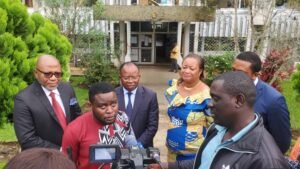
“Most persons with disabilities have lost hope… A lot of them have been suffering from depression, trauma and other mental health complications,” Kesah, who recently completed a study on the impact of the Cameroon Anglophone Conflict on persons with disabilities in the Northwest and Southwest Regions, explained. He furthered that though life was not perfect for these persons before the eruption of the conflict, they have been completely plunged into hardship and misery.
According to the organizers, the workshop was a “healing session for participants,” as presentations on self-awareness, self-esteem and mental health in conflict times, helped them pour out their pains and regain faith in themselves. “You cannot afford to not believe in yourself,” Lenjoh Pelagie, a speaker at the workshop, told participants. She said in conflict times, a lot is bound to happen, but persons with disabilities must not lose that which is crucial for survival – hope.
Schooling them on the principles of entrepreneurship, Desmond Kum, a visually impaired high school Philosophy Teacher and Ph.D. Law Fellow at the University of Bamenda, said it’s time for them to stop shying away from business, and engage in profit driven activities. “We must become the actors of our lives,” he said.
“The training surpassed my expectations,” Meh Becajum told the press. He focused, for the entire duration of the training, on recycling, making such items as flower jars from abandoned bottles.
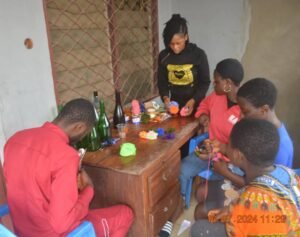
“I’ve always wanted to pick abandoned items and transform them into beautiful products, But I have never really had the opportunity to get close to those people who can give me the basics to perfect what I have been trying to do,” Elizabeth Etonge, a mobility impaired participant, revealed. She expressed that her only challenge now, is being able to get some capital to start a business around the newly acquired skill, a challenge captured by another participant, Diana Wirndzerem: “If I’m able to go on producing beaded chains, bangles, earrings and shoes as I’ve learned from here, I would be able to make enough profit to supply my basic needs. But finance is a huge challenge,” the visually impaired who travelled from Baffoussam, West Region of Cameroon to partake in the training, told pressmen.
The organizers of the workshop, affectionately called Reformers, have said they are doing all it takes to ensure that the impact of the training is sustainable. “We will not have peace until what we’ve started is ended,” Louis Tita, APROGLOHWCES’ Founder, emphasized. “Our goal is to ensure that persons with disabilities and vulnerabilities can put food on their table.”
The Reformers distributed production material to some outstanding participants, pledging to certify the most promising at the end of three months. “When we certify them, they will serve as trainers in subsequent programs,” Kesah explained. He told the press that they plan to establish shops everywhere the training is done, so as to provide the trainees with a constant supply of material, while helping with marketing and sales. “This is why we’re appealing for people to support this initiative,” he pointed.
The disabled and vulnerable trainees equally left the workshop with schoolbags, buckets and other sanitary kits, donated by a partner organization, Hope for All Cameroon.
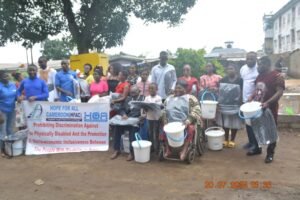
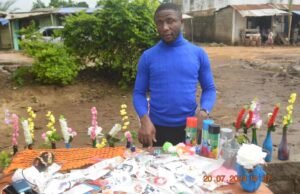
The five-day skills acquisition workshop ended with a grand exhibition, showcasing the items the participants had produced. The exhibition, visitors said, shattered their prejudices about persons with disabilities and vulnerabilities.
